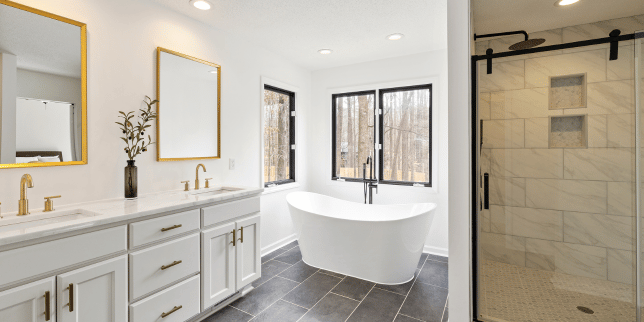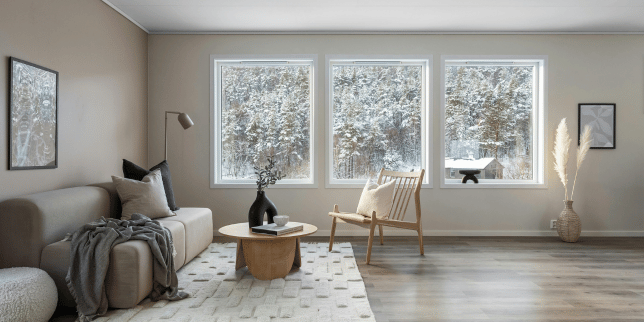10 Common Planning Mistakes to Avoid for Your Home Remodel
April 16th, 2024
4 min read

Are you gearing up for a home remodeling project but feeling overwhelmed by the many decisions and uncertainties ahead? You're not alone. Many homeowners dive into renovations without a clear plan. This often leads to frustration, delays, and budget overruns.
Without proper preparation, you risk turning your dream remodel into a headache.
With over two decades of experience in the industry, we have had the opportunity to walk with homeowners through the complexities and pitfalls of home remodeling.
In this article, you'll gain invaluable insights into the common planning mistakes to avoid during a home remodel:
- Underestimating the Budget
- Ignoring Building Codes and Permits
- Overlooking Structural Issues
- Choosing the Wrong Materials
- Poor Project Management
- Skipping the Design Phase
- Overlooking the Importance of Lighting
- Neglecting Energy Efficiency
- Failing to Consider Future Needs
- Not Planning for Contingencies
1. Underestimating the Budget
One of the most common mistakes homeowners make is underestimating the true cost of their remodeling project. Every remodeling project will require two things from you: time and money. Planning and tracking expenses is important to keeping your remodeling investment on track.
Start by choosing your remodeling approach. The route you choose—DIY, self-managed, or design-build—will be the largest investment (time and money).
If you’ve decided to go with a self-managed or design-build, the next step is to research and collect quotes. Consider what you are looking for in a contractor, and watch out for several red flags.
The contractor(s) you choose is your most important decision. Find one that you know, like, and trust!
2. Ignoring Building Codes and Permits
If you have decided to approach your remodel through a DIY or self-manage process, one of the biggest risks you face is not getting the right permits or following local rules. This error can lead to expensive fines, delays, or legal issues. Before you begin your remodel, research the permits you need and ensure your project follows all the rules in your area.
Consulting with a professional or hiring a reputable contractor can help ensure your remodel stays within regulations.
3. Overlooking Structural Issues
Some homeowners focus on making their homes look better without fixing hidden structural problems. But ignoring issues like bad wiring, plumbing, or weak foundations can cause bigger problems later. Before making any cosmetic changes, you and your contractor should check and update your home for function and code.
4. Choosing the Wrong Materials
Choosing the wrong materials for your remodel can cause problems. Selections affect the aesthetic and function of your home. It's essential to choose materials that not only align with your design vision but also meet your practical needs and lifestyle.
If you work with a designer or design-build firm, both will have the capabilities to help you choose materials that align with your vision.
Research different materials, consider their pros and cons, and seek guidance from design professionals or contractors. This will ensure that you make informed decisions.
5. Poor Project Management
Effective project management is key to the success of any home remodeling project. If you hire a design-build firm, you can rely on their team for all aspects of project management. However, if you are self-managing your project, rushing into a remodel without a clear plan or timeline will lead to confusion, delays, and costly mistakes.
Make a detailed plan for your project, set realistic timelines, and divide your resources. Keep in touch with contractors and suppliers to ensure everyone understands what needs to be done.
6. Skipping the Design Phase
Designing your remodel is crucial. It’s the time to lay the foundation for your project. If you are DYIng or self-managing your project, it might be tempting to skip past or shorten the design process for efficiency.
Throughout the years, we have seen the consequences of rushing into the construction phase. Without a well-planned plan, construction issues frequently occur, causing wasted time, materials, and money.
If you work with a design-build firm, they will have the process laid out for you. A good firm will prioritize solidifying all aspects of your project before construction begins.
This includes a scope of work (detailed written plan), all material selections, a site plan (sometimes referred to as a material drop form), and detailed construction drawings. These four documents are the foundation for any great remodeling project.
7. Overlooking the Importance of Lighting
Lighting is an often overlooked aspect of home remodeling that can impact the look and feel of your space. Poorly designed lighting can make a room feel dark, cramped, and uninviting. Conversely, a well-lit room can enhance ambiance, highlight architectural features, and improve functionality.
Consider incorporating various lighting sources, including overhead fixtures, task lighting, and accent lighting, to create a layered lighting scheme that meets your needs and enhances your home's atmosphere.
8. Neglecting Energy Efficiency
In today's eco-conscious world, energy efficiency is essential for any home remodel. Neglecting to incorporate energy-efficient features and materials into your project can result in higher utility bills, increased environmental impact, and missed opportunities for long-term savings.
When planning your remodel, consider investing in energy-efficient appliances, Energy Star-certified windows, spray foam insulation, and efficient HVAC systems to cut your home's energy consumption and reduce your carbon footprint.
9. Failing to Consider Future Needs
If you plan to stay in your home for years to come, it's essential to consider not only your current needs but also your future requirements. A renovation project presents an ideal opportunity to integrate features that accommodate future growth, lifestyle changes, or the need for aging-in-place.
Consider how your needs may evolve and incorporate universal design elements, flexible living spaces, and ample storage to ensure your home remains functional and adaptable for years.
10. Not Planning for Contingencies
No matter how well you plan your home remodel, unexpected challenges and setbacks are inevitable. Failing to plan for contingencies can leave you unprepared to deal with delays, budget overruns, or unforeseen issues that arise during the project.
Build flexibility into your project timeline and budget to account for unexpected expenses, changes in scope, or delays due to factors beyond your control. By planning for contingencies upfront, you'll be better equipped to handle whatever comes your way.
Next Steps to Remodeling Your Home
As you embark on your home remodeling journey, it's crucial to remember the challenges and pitfalls that can arise without proper planning and foresight. By being proactive and avoiding common mistakes, you can ensure a smoother and more successful remodeling experience.
Through this article, you've gained valuable insights into the common mistakes to avoid during a home remodel.
At Custom Built Design & Remodeling, we're passionate about helping homeowners like you transform their spaces into stunning, functional, and comfortable living environments. With over two decades of experience in the industry, we have the expertise and knowledge to guide you through every step of your remodeling journey.
Ready to turn your remodeling dreams into reality? Contact our team of design-build professionals today to schedule a consultation and take the first step toward your dream home. Let us handle the details while you sit back and watch your vision come to life.
Now that you know more about the common planning mistakes to avoid for your home remodel, let’s take a look at how to budget for your build, how a design-build firm’s communication style benefits your project, and how to vet your remodeling contractors:
- How to Budget for Your Remodel - Ready to start budgeting for your project? Discover how to approach this endeavor via our informative article properly
- 7 Ways Design-Build Firms' Communication Style Benefits Home Remodels - Discover how design-build firms’ communication style can promote the success of your remodeling project.
- Top 8 Questions to Ask Before Hiring a Remodeling Contractor - A list of essential questions to ask your prospective remodeling contractor before hiring them for your project; with additional questions included in each section.
Isabelle has worked at Custom Built for over 7 years, learning the systems from all sides. She has become an industry advisor in the customer relations software HubSpot, has a keen talent for elements of design, and currently leads the marketing team under the innovative Endless Customers system.
Topics:


























